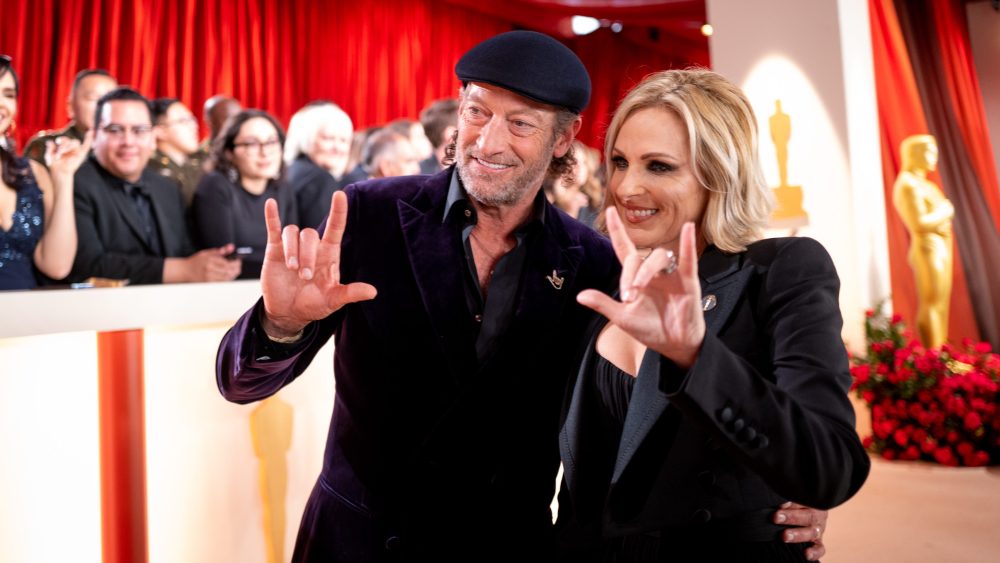
One year after the landmark success for Best Picture winner “CODA” at the Academy Awards, the 2023 Oscars presented the latest opportunity for Hollywood to show the world where it stands on inclusion and diversity.
On Oscars night, through a combination of memorable moments and inclusive components of the ceremony, the Academy of Motion Picture Arts and Sciences demonstrated its growing commitment to embracing inclusion and accessibility for all.
For the second time, a free ASL livestream was available on the Academy’s YouTube channel. The livestream was updated this year to enhance accessibility for viewers. On the red carpet, a team of ASL interpreters helped participants more effectively engage with fans and viewers at home, with members of the media receiving guidelines on how to make their pre-show coverage more accessible. Meanwhile, stage accessibility included not only ramp access but a stage wheelchair lift for the first time as well.
During the awards ceremony, “CODA’s” Troy Kotsur, who is deaf and made history by winning the 2022 Oscar for Best Supporting Actor, returned to present the same award this year.
Another particularly meaningful moment for inclusion occurred when actor with Down syndrome James Martin, who was on stage upon “An Irish Goodbye” winning the Oscar for Best Live Action Short Film, was serenaded by the audience for his 31st birthday. Much like how Zack Gottsagen became the first person with Down syndrome to present an award at the 2020 Oscars with “The Peanut Butter Falcon” co-star Shia LaBeouf, this was another example of authentic representation in film.
In fact, the Academy Awards ceremony has been becoming more inclusive with each year. Since 2021, the ceremony has featured an ASL interpreter in the event’s media room, in addition to various other inclusive components such as closed captioning, audio descriptions, and an accessible stage with a ramp.
The Academy’s commitment to a more inclusive experience reflects its partnership with the Ruderman Family Foundation, the organization that I lead. Our three-year, $1 million grant to the Academy Foundation helps champion new perspectives on filmmaking and film history as well as an accessible and equitable experience for audiences of all backgrounds. The grant funding supports content and accessibility services at the Academy Museum and helps fund Academy Gold Rising, an internship enhancement program for college-age students and emerging professionals from communities underrepresented in the film industry.
While we celebrate this multifaceted progress for inclusion in the entertainment industry, it is also important to remember that Hollywood’s work in this realm is far from done. This is particularly true when it comes to the practice of authentic representation — casting actors with disabilities to play characters with disabilities.
Despite the supporting actor award for “CODA’s” Kotsur, 56% of entertainment consumers who are deaf still believe that they “rarely” or “never” see their identity represented in film and television, according to a recent National Research Group study.
That is precisely why the Ruderman Family Foundation works behind the scenes to foster progress. Since 2019, we have awarded the Seal of Approval for Authentic Representation, a designation that has become an industry staple through its recognition of films and television series which demonstrate a commitment toward full inclusiveness in popular culture. The honor is awarded when productions meet two criteria: they feature actors with disabilities with a speaking role of at least five lines, and they are in or on the verge of general release. The Foundation announces the honor whenever a film or TV series meets those standards.
In the year since “CODA’s” success at the Academy Awards, the Foundation has awarded the Seal of Authentic Representation to 10 shows and films. By publicly recognizing these studio productions, we are affirming and reinforcing the practices of the changemakers who are moving the entertainment industry in the right direction, in hopes that others will follow their lead.
How can influencers who are working both inside and outside the entertainment industry ensure that the momentum continues on inclusion and authentic representation?
The actors themselves have an opportunity to effect change. Notably, past Oscar winner Marlee Matlin had refused to star in “CODA” unless other actors with hearing disabilities were cast. Her principled stand paid off, not just for the actors and the film, but for the industry as a whole.
More recently, this January, jurors for the Sundance Film Festival’s U.S. Dramatic Competition walked out of the premiere of “Magazine Dreams” over the festival’s failure to provide sufficient captioning for audience members who are deaf. Matlin was among the competition’s jurors.
Thirty-six years separated the 1986 Best Actress win for Matlin, who is deaf, and Kotsur’s 2022 Oscar for “CODA.” Even though this year’s Academy Awards did not bring a similar milestone, the Academy’s commitment to inclusion and today’s shifting landscape in Hollywood mean it is all but assured that we will not need to wait nearly as long to see the next Oscar for an actor with a disability.
Producers, directors, and casting directors also have a hand in making a difference. Not only they can (and should) insist that the roles written of characters with disabilities are played by actors with disabilities, they should also include people with disabilities in the various roles of production.
As proud advocates in the journey toward greater authentic representation, the Ruderman Family Foundation and our partners, along with other organizations dedicated to this issue, were gratified to witness yet another momentous night for inclusion at the 2023 Oscars. We are hopeful that both the entertainment industry and the general public will view such moments not as the climax of the authentic representation movement, but as another step along the ongoing road to enduring, systemic change.
Jay Ruderman is President of the Ruderman Family Foundation.













